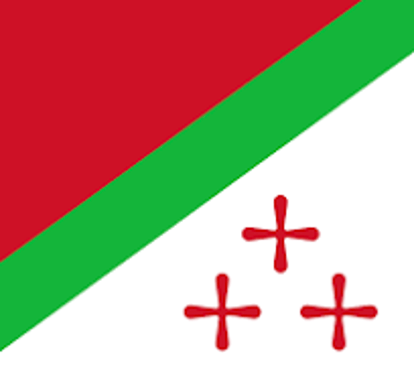Gabonaise for Brass Quintet
Gabonaise for Brass Quintet
''La Concorde" ("The Concord") is the national anthem of Gabon.
Adopted upon independence in 1960, “La Concorde” was written and composed by Georges Aleka Damas. Damas had held many diplomatic posts in Gabon since the mid 1940s, and was actively involved in politics and in the formation of labour unions.
“For The Gambia Our Homeland” is the official anthem of this English speaking nation in the heart of French-speaking West Africa. Adopted upon 1965 independence, the music, from the traditional Mandinka song “Foday Kaba Dumbuya”, was adapted by the husband of the lyricist, Jeremy Frederic Howe.
“For The Gambia Our Homeland” is the official anthem of this English speaking nation in the heart of French-speaking West Africa. Adopted upon 1965 independence, the music, from the traditional Mandinka song “Foday Kaba Dumbuya”, was adapted by the husband of the lyricist, Jeremy Frederic Howe.
The music for the national anthem was originally composed by Philip Gbeho and sung to lyrics written by Emmanuel Pappoe-Thompson. However the words were revised by a literary committee in the Office of the then head of state, Kwame Nkrumah. Michael Kwame Gbordzoe has made claims to the current lyrics being used saying that it was written by him after the overthrow of President Nkrumah. A competition was held and Kwame Gbordzoe, who was then a student at Bishop Herman College, presented the current lyrics which were chosen to replace "Lift High The Flag Of Ghana" which had been officially adopted after independence and used as Ghana's national anthem during Nkrumah's presidency
"God Bless Our Homeland Ghana" is the national anthem of Ghana; it was adopted in 1957 when Ghana declared its independence from the United Kingdom.
The music of the anthem is derived from a praise song for the late-1800s king of Labé, in Fouta Djallon, Alpha Yaya Diallo (or Alfa Yaya). Alpha Yaya is, along with Wassoulou Empire founder Samory Touré, considered central by Guineans to the foundation of the modern Guinean nation, in part because of his fierce attempts to resist colonisation.
In 1904, Alpha Yaya was one of many traditional chiefs and kings summoned to a doctrinal conference with French colonists, who were still in the process of consolidating his territory. The chiefs each brought along a retinue for the journey; in Alpha Yaya's retinue was griot Korofo Moussa, from Kissidougou in the south of the country. Alpha Yaya arrived to the conference on its sixth day, and Korofo Moussa is said to have spontaneously improvised, along with his troupe of dancers and kora players, a praise song for Alpha Yaya after he arrived. The song began with the line "Alpha Yaya, Mansa bè Manka" ("Alpha Yaya, mansas (kings) are not the same"). According to Fodéba Isto Keira, former Minister of Youth, Sports and Culture, the performance took place in the building of the modern Directorate of the Judicial Police in the Kaloum sub-prefecture of Conakry.
The anthem was adopted upon independence on 2 October 1958 and included in article 1 of the constitution of 10 November 1958. A translation of the anthem into Maninka was made by Djeli Mamoudou Kandé (c. 1935 – 2008[8]) from the Instrumental Ensemble. According to Kandé, while Minister of the Interior, Fodéba Keïta had in fact asked him to write the lyrics for the anthem some months after independence.
The anthem is played on national television at the close of every broadcasting day.
"Esta É a Nossa Pátria Bem Amada" (English: "This Is Our Well Beloved Motherland") is the national anthem of Guinea-Bissau. Written in 1963 by Amílcar Cabral (1924–1973) and composed by Xiao He (1918–2010), it was adopted upon independence from Portugal in 1974.
It was also the national anthem of Cape Verde, a legacy of both countries' joint independence, until 1996, when a new anthem ("Cântico da Liberdade") was adopted by Cape Verde
The anthem was written by independence leader of Guinea-Bissau and Cape Verde Amílcar Cabral. Cabral, a Bissau-Guinean son of Bissau-Guineans and Cape Verdeans, was the leader of the African Party for the Independence of Guinea and Cape Verde (PAIGC).
In 1963, a delegation from then Portuguese Guinea visited China and heard music by composer Xiao He. Cabral asked Xiao to compose a piece that would inspire his people in their struggle for independence. Set to a 1963 poem by Cabral, the piece was later adopted by Guinea Bissau and Cape Verde as the national anthem upon their independence from Portugal in 1974.
In the 1990s, after the African Party for the Independence of Cape Verde allowed multi-party rule, it was decided that Cape Verde should adopt its own national symbols, including a flag and anthem. A new anthem, "Cântico da Liberdade", was adopted in 1996.
"Ee Mungu Nguvu Yetu"'s lyrics were originally written in Kiswahili, the national language of Kenya. The commission responsible for its creation included five members and was headed by the Kenya Music Adviser. The anthem was based on a traditional tune sung by Pokomo mothers to their children.
"Ee Mungu Nguvu Yet" is notable for being one of the first national anthems to be specifically commissioned. It was written by the Kenyan Anthem Commission in 1963 to serve as the state anthem after independence from the United Kingdom. The lyrics was intended to express the deepest convictions and highest aspirations of the people.
La Katangaise ("The Katangese") was the national anthem of the State of Katanga. The music was composed by Joseph Kiwele, who was Katanga's Minister of National Education. After the State of Katanga was dissolved in 1963 and integrated into the Democratic Republic of the Congo, a new anthem was adopted.
La Katangaise ("The Katangese") was the national anthem of the State of Katanga. The music was composed by Joseph Kiwele, who was Katanga's Minister of National Education. After the State of Katanga was dissolved in 1963 and integrated into the Democratic Republic of the Congo, a new anthem was adopted.













